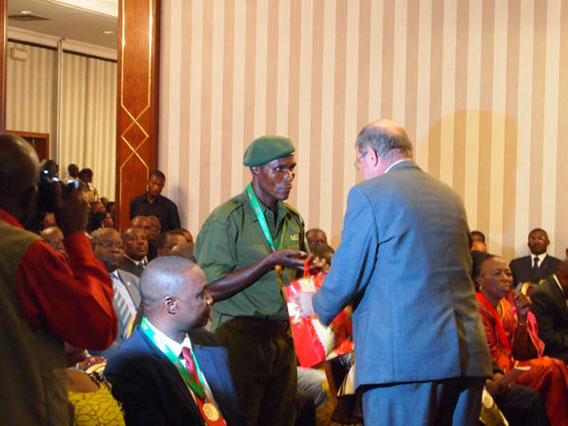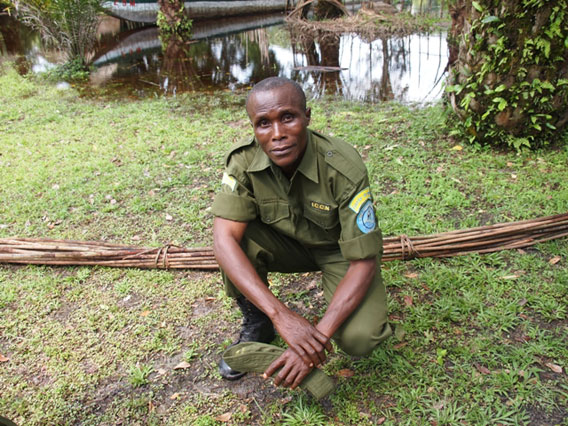
Bunda Bokitsi. Photo by: Zoological Society of Milwaukee (ZSM).
The effort to save wildlife from destruction worldwide has many heroes. Some receive accolades for their work, but others live in obscurity, doing good—sometimes even dangerous—work everyday with little recognition. These are not scientists or big-name conservationists, but wildlife rangers, NGO staff members, and low level officials. One of these conservation heroes is Bunda Bokitsi, chief guard of the Etate Patrol Post for Salonga National Park in the Democratic Republic of the Congo. In a nation known for a prolonged civil war, desperate poverty, and corruption—as well as an astounding natural heritage—Bunda Bokitsi works everyday to secure Salonga National Park from poachers, bushmeat hunters, and trappers. In his years of service as a wildlife ranger, and now chief guard, Bokitsi has not only put his life on the line, but has also been falsely imprisoned and even tortured.
“If, for example, today I receive the instruction to follow poachers in the forest, I see such situations as if either the poacher or I will have to leave this world,” Bokitsi told mongabay.com. “Poachers are destroying where we are living. In 2002, when I was the chief of the patrol post at Boangui, I found two poachers with guns and two big elephant tusks in the forest while I was on patrol […] One of the poachers ran away, the other started shooting at us. I returned fire and was finally able to capture him; his name was Batuka. [We] recuperated the ivory. In situations like that, it becomes body to body. Anything can happen.”
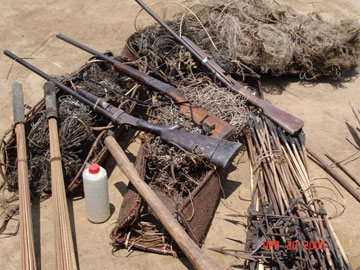 Confiscated weapons from poachers. Photo by: Zoological Society of Milwaukee (ZSM). |
Bokitsi is one of the year’s recipients of the Alexander Abraham award, established in part to give recognition to conservation heroes on the frontlines in Asia and Africa. Many of its awards are given posthumously to those who have lost lives in the battle to save the world’s wild places. This year seven men were honored who had lost lives in duty; nine others, including Bokitsi, also received awards.
Having worked in Salonga National Park since 1990, and lived in the area all his life, Bokitsi has seen many changes.
“There was a huge amount of poaching back [in the 90s]—park guards could be attacked in their patrol posts by poachers in broad daylight. The poachers would just take everything, including the guards’ and the fishermens’ wives. An example is right here next to Etate, where there is a little fishing camp called Boma Libala [Lingala for the “breaker of marriages”]. […] Poaching was occurring all over. Nowadays, the veil covering the villager’s eyes is being removed. They start understanding the importance of the park as a haven where animal populations can be at ease and reproduce.”
However, the ongoing poaching has left its mark.
“[There] used to be an elephant bath called Papa Baudouin—elephants used to be all over that place. Now the old bath is overgrown; no single elephant visits the place anymore,” Bokitsi says.
Salonga National Park, the largest rainforest reserve on the continent, is home to an incredibly rich array of wildlife, including bonobos (Pan paniscus), listed as Endangered by the IUCN Red List; leopards (Panthera pardus), bongos (Tragelaphus eurycerus eurycerus, the African golden cat (Profelis aurata), tree pangolin (Manis tricuspis), okapi (Okapia johnstoni)—all listed as Near Threatened; African slender-snouted crocodiles (Crocodylus cataphractus), Data Deficient; the Congo peacock (Afropavo congensis), Vulnerable; and forest elephants (Loxodonta cyclotis). Smaller and with straighter tusks than their savannah cousins, recent research has argued that forest elephants are in fact a distinct species from Africa’s savannah elephants.
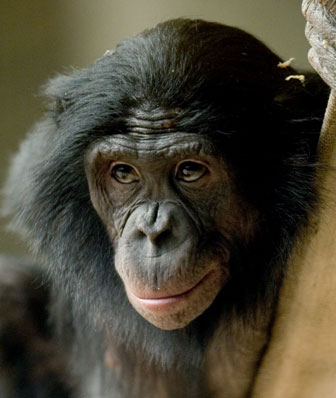 Bonobo. Photo by: Richard Brodzeller. |
Bokitsi’s work is supported by the Bonobo and Congo Biodiversity Initiative (BCBI), a program under the Zoological Society of Milwaukee (ZSM). The BCBI is headed by Gay Reinartz (referred to by Bokitsi as Mme Gay), who has spent a lot of time working with Bokitsi and his men as well as supporting local communities. Bokitsi often acts as an outspoken advocate for the park and conservation in local communities, speaking out against poaching and bushmeat hunting. He told us an example of what he says to villagers: “‘I tell this to you for your life and the life of your children. Mme Gay comes here and gives you things for the school, seeds and tools, and the agronomists teach you how to farm. All this is done so that you can erase the spirit of destruction from your life. […] Mme. Gay does not come here to control you, but to find out whether you succeed to elevate your level of life.'”
Bokitsi sees Salonga National Park as a treasure to pass down to his children, and he adds that people worldwide need to understand the value of such places and never give up protecting them.
“The people that will read this article have to know the value of the forest, the importance of the Salonga National Park. Because others have read, but they have not seen. Maybe some have seen some of the animals that live here in a zoo. If today we don’t protect the park and its species, we will soon be protecting an empty box. […] As for the Congo; it is a rich country. It’s good to live here. The richness comes from its forests. When we build the Congo, everything will be at peace and people will want to live here. The park is now the storeroom.”
In a November 2011 interview Bunda Bokitsi tells mongabay.com of his time wrongfully imprisoned for shooting a poacher, explains what a usual day is like for him now as chief guard, and reveals his favorite animal in the forest.
INTERVIEW WITH BUNDA BOKITSI
Bunda Bokitsi receiving his Alexander Abraham award. Photo by: Zoological Society of Milwaukee (ZSM).
Mongabay: First, congratulations on winning the Alexander Abraham Award. What does this recognition mean to you?
Bunda Bokitsi: It shows that the work I’ve done is rewarded. I’m very content; without this work I could not have gotten where I am today. The award helped me prepare the future of my children and set an example for both my children and my colleagues to dedicate themselves to conserve the animals and plants of the DRC. I hope that one day my children will be able to follow the path I’ve chosen.
Mongabay: Why is Salonga National Park an important reserve for the world?
Bunda Bokitsi: It’s important because the forest contains a lot of richness and still hidden resources like trees and various animals. The trees make our air breathable. The importance of the Salonga was not known previously. Now, however, with the research and the knowledge of the effects of forest destruction, we understand the importance to preserve such a place. The park can also become a factor of development for the country because of its richness.
Mongabay: What species are most endangered in the park?
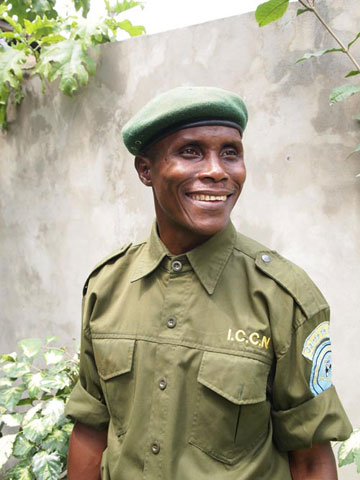 Bunda. Photo by: Zoological Society of Milwaukee (ZSM). |
Bunda Bokitsi: Especially the forest elephant—this species is most threatened. But other mammal species such as smaller monkeys and various antelopes like the Bongo and Sitatunga are menaced too. For bonobos, at present, the menace is still limited in the park—but this can quickly change.
Mongabay: For years Salonga National Park was being invaded by armed poachers and rebel forces. How have you and other rangers dealt with this threat?
Bunda Bokitsi:From our side, we’ve understood the importance of the park. The guards could not just sit there and watch the poachers destroy the Salonga. Thanks to support from various partner NGO’s, the guards received the means to do something about it—and this support continues to date.
Mongabay: Have you ever been afraid for your life?
Bunda Bokitsi: Yes; situations like that happen. If, for example, today I receive the instruction to follow poachers in the forest, I see such situations as if either the poacher or I will have to leave this world. Poachers are destroying where we are living. In 2002, when I was the chief of the patrol post at Boangui [South Secteur, Salonga National Park], I found two poachers with guns and two big elephant tusks in the forest while I was on patrol with Isasi [another park guard, also currently stationed at Patrol Post Etate]. One of the poachers ran away, the other started shooting at us. I returned fire and was finally able to capture him; his name was Batuka. Isasi and I recuperated the ivory. In situations like that, it becomes body to body. Anything can happen. Unfortunately, the poacher’s companion managed to get away; he is the renowned poacher [called] “Microbe.” That day I was on the winning side.
Mongabay: In the years you have lived and worked in Salonga National Park, how has the region changed?
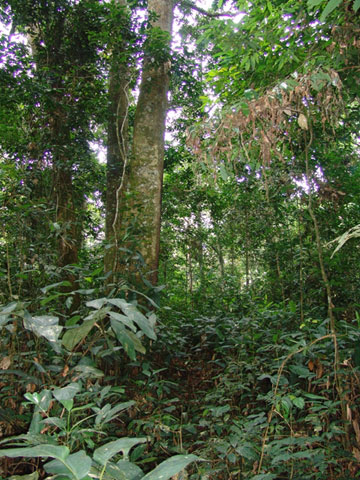 The dense forest of Salonga National Park. Photo by: Zoological Society of Milwaukee (ZSM). |
Bunda Bokitsi: I started my career as a guard in 1990. There was a huge amount of poaching back then—park guards could be attacked in their patrol posts by poachers in broad daylight. The poachers would just take everything, including the guards’ and the fishermens’ wives. An example is right here next to Etate, where there is a little fishing camp called Boma Libala [Lingala for the “breaker of marriages”].
Things like this don’t happen anymore; over the years, guards got better equipped and trained to deal with poachers.
Back then, the villagers living around the park did not care for it to be there. Poaching was occurring all over. Nowadays, the veil covering the villager’s eyes is being removed. They start understanding the importance of the park as a haven where animal populations can be at ease and reproduce.
Between Etate and the village of Bofoku Mai, on the Salonga River, used to be an elephant bath called Papa Baudouin—elephants used to be all over that place. Now the old bath is overgrown; no single elephant visits the place anymore. But at least peace has returned.
Mongabay: You spent months wrongfully in jail for shooting a poacher who later died. What impact has that terrible experience had on you?
Bunda Bokitsi: I’ve suffered greatly in prison because most military chiefs are the enemies of park guards. They know that the guards are there to protect the park, whereas it’s the military who give the guns to the poachers. So, whenever they get a guard in their custody, they will treat him really badly and torture him. Members of my family that reside in Boende had to pay 5,000 Congolese francs [~$5.5] just to be able to bring me food in prison. The military auditor told me that, as I had taken away the meat he had ordered from the park, I would now suffer for that. So yes, the experience was a hard one, but it has not changed me. I still do not fear to go in the forest and do my work. If I were afraid now, I wouldn’t be able to do my job.
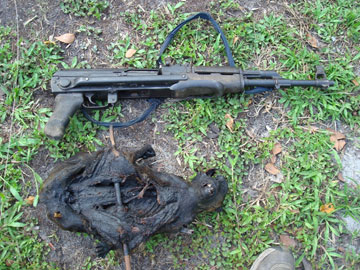 A poached and smoked monkey for bushmeat with confiscated weapon. Photo by: Zoological Society of Milwaukee (ZSM). |
In June 2010, Edmond, Bwase and Ndjuma [Etate guards] were ambushed on their patrol by a poaching gang led by the renowned [poacher] “Tofene”. The guards were tortured, beaten with spiked sticks, humiliated, and their equipment and two guns were taken from them. The guards lived through this incident, yet shortly thereafter the military authorities sent indictment papers to the ICCN Station of Watsi Kengo; they demanded the arrest of these three [innocent] Etate guards [ICCN: Institut Congolais pour la Conservation de la Nature; the Congolese Institute for Nature Conservation—the national park authority in DRC). When ICCN’s Watsi Kengo Conservator refused to deliver these guards to the military, they even wanted to arrest me [as the guards’ supervisor].
Mongabay: You currently head up a patrol team [Etate] that lives deep in the forest. Is being away from your family difficult?
Bunda Bokitsi: For me, this is a good thing. I have not studied a lot. I need to continue to search so I can educate my children. If I stay always next to my wife, there will always be little problems that slow things down. But I do not know the wishes of the other guards—they may have more problems with that.
Mongabay: What does working at the Etate Patrol Post mean for you?
Bunda Bokitsi: Working at Etate changed my life drastically as compared to when I lived and worked around Monkoto [ICCN Park Headquarters]. I now have research built into my patrols and work with a compass, map and GPS. In Monkoto, there was no follow-up [of patrols], and a lot of the patrol data were fake. Here, in Etate, this is impossible. You can’t go out on patrol and just sit around and do nothing. This makes me very proud—these are things that I never thought would happen in my life. I started training my first child Bwase [Bunda refers to ‘his’ Etate guards as his children]. Everyone can see now that the other guards also pick up these skills, and this makes me very proud.
Mongabay: What is a normal day like for you now?
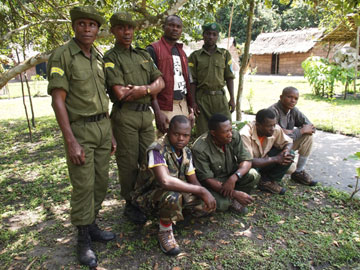 Bunda and the team of Etate guards. Photo by: Zoological Society of Milwaukee (ZSM). |
Bunda Bokitsi: The ambiance when I’m in the forest is different; I’m at one with my work there. When I’m in camp, I long to be in the forest, and I prepare to get on the next patrol as soon as possible.
While on patrol, we get up around 5a.m. and eat the remains of the previous night’s meal. If a bit of coffee is available, we have a cup. We pack up our things into the backpacks and then continue the patrol around 6 a.m. At noon, we have a one-hour break. Around 4 p.m., we start looking for a place to set up camp, so we search for a little rivulet with clear water. We find some dry wood and make a fire while others wash up and change clothes We hang our patrol clothes next to the fire so they can dry out. We then prepare a meal with smoked fish and chiquangue [processed manioc paste wrapped up in a big leaf], talk about whatever comes up or the events of the day, and plan for the next. Anywhere between 6 p.m. and 8 p.m., we go to sleep under our tarp.
At Etate, the schedule is about the same. I send some of the guards out in the morning to check our fishing nets, and I talk to the team around 7.30 a.m. Some guards will go to the nearby villages to buy chiquangue for the next patrol, while others do some maintenance work in the patrol post. I also copy my patrol data onto datasheets for ZSM and the ICCN, and decide to what area our next patrol should go.
Mongabay: There are very poor people living in villages surrounding the park—like for instance in Bofoku Mai close to your patrol post. How do you explain to them that they can’t get bushmeat from the park?
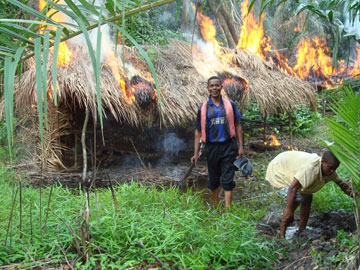 Rangers burn poachers’ camp. Photo by: Zoological Society of Milwaukee (ZSM). |
Bunda Bokitsi: I give them examples of how life is in other villages, such as in Monkoto, and show them that things are different there—there is development. I ask them to consider changing their mentality so that Bofoku Mai can also become developed. I tell them that once they respect the park, they can really start changing their situation.
Recently, I talked to the Bofoku Mai villagers. This is what I said:
“I tell this to you for your life and the life of your children. Mme Gay comes here and gives you things for the school, seeds and tools, and the agronomists teach you how to farm. All this is done so that you can erase the spirit of destruction from your life. With everything you gain here like this, in Monkoto no one would accept that there were poachers among them. Mme. Gay does not come here to control you, but to find out whether you succeed to elevate your level of life.”
Mongabay: Having spent so much time in the Congo will you tell us about a memory (or memories) of amazing wildlife encounters?
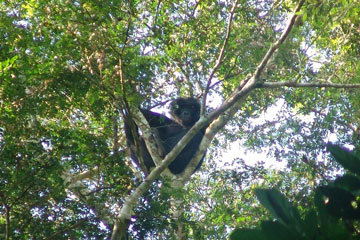 Wild bonobo at Etate. Photo by: Zoological Society of Milwaukee (ZSM). |
Bunda Bokitsi: In 2002, when I was in Lokofa [an area in the Southern Secteur on the Luilaka River] working with Mme. Gay and Mr. Steven (Steven Weeks, an American raised in Mbandaka, DRC), we were working on some transects there. On one of the transects, we were suddenly face to face with bonobos. It was a group of 13. The bonobos were really close, like that lemon tree here [he points 10 yards away], and they even threw shit at us! Some other bonobos were screaming “wo wo wo” because they saw the white man for the first time. There was a bonobo baby climbing in a low tree, and I wanted to take it in my hand, but Mme. Gay told me not to. (Laughs)
Mongabay: I have to ask, what’s your favorite animal?
Bunda Bokitsi: I like them all; I don’t have a favorite. All the animals that live together in one place belong together. One has to “favorize” them all! When I go to a place and find someone who killed an elephant, I can’t say “oh, that’s no problem because I like bonobos more.” No, I’d be equally furious with the people that killed whichever animal!
Mongabay: What would you like our global audience to know most about the Congo rainforest and the Democratic Republic of the Congo (DRC)?
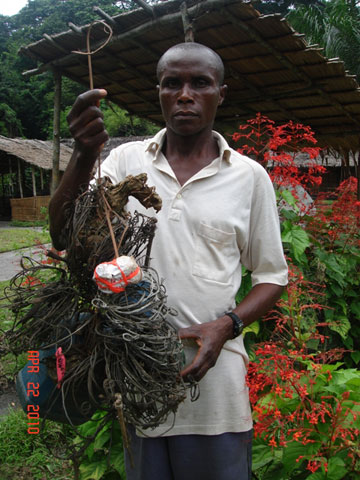 Bunda with confiscated snares. Photo by: Zoological Society of Milwaukee (ZSM). |
Bunda Bokitsi: The people that will read this article have to know the value of the forest, the importance of the Salonga National Park. Because others have read, but they have not seen. Maybe some have seen some of the animals that live here in a zoo. If today we don’t protect the park and its species, we will soon be protecting an empty box. If we can keep seeing animals with our own eyes like this, then one day researchers and tourists will come to see them.
As for the Congo; it is a rich country. It’s good to live here. The richness comes from its forests. When we build the Congo, everything will be at peace and people will want to live here. The park is now the storeroom. Outside of the park, things are not great; people do not protect wildlife and just kill all animals.
If a tree is standing straight, the roots are well locked into the ground. But when the tree is tilted, there is pressure on its roots, and other trees will get crushed when the big tree falls. This is Congo. We need to put the tree straight.
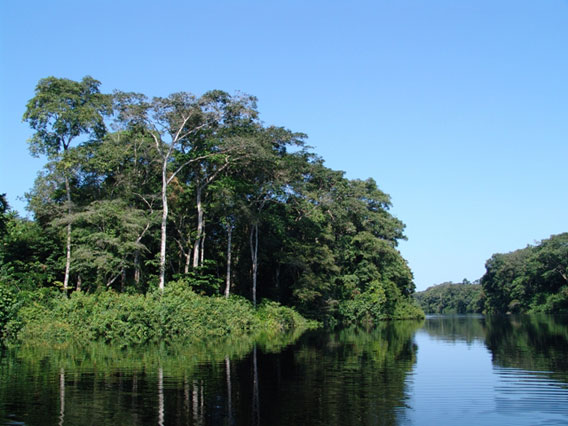
Forest and river in Salonga National Park. Photo by: Zoological Society of Milwaukee (ZSM).
Forest elephant in Gabon. Photo by: Rhett A. Butler.
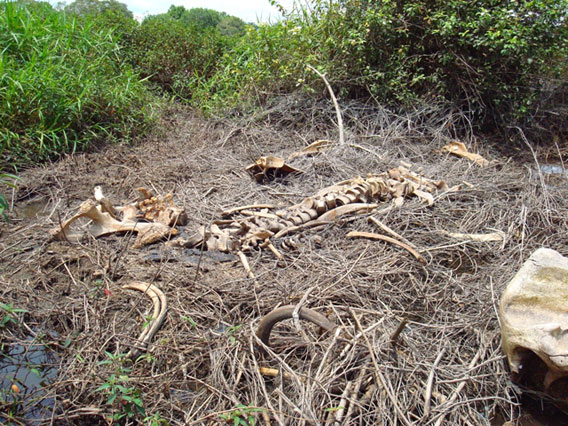
Skeleton of a poached forest elephant in Salonga National Park. Photo by: Zoological Society of Milwaukee (ZSM).
Sitatung, a central African antelope, in Gabon. Photo by: Rhett A. Butler.
Related articles
Into the Congo: saving bonobos means aiding left-behind communities, an interview with Gay Reinartz
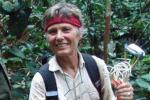
(09/23/2010) Unlike every other of the world’s great apes—the gorilla, chimpanzee, and orangutan—saving the bonobo means focusing conservation efforts on a single nation, the Democratic Republic of the Congo. While such a fact would seem to simplify conservation, according to the director of the Bonobo and Congo Biodiversity Initiative (BCBI), Gay Reinartz, it in fact complicates it: after decades of one of world’s brutal civil wars, the DRC remains among the world’s most left-behind nations. Widespread poverty, violence, politically instability, corruption, and lack of basic infrastructure have left the Congolese people in desperate straits.
Fighting poachers, going undercover, saving wildlife: all in a day’s work for Arief Rubianto
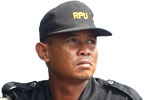
(09/29/2010) Arief Rubianto, the head of an anti-poaching squad on the Indonesian island of Sumatra best describes his daily life in this way: “like mission impossible”. Don’t believe me? Rubianto has fought with illegal loggers, exchanged gunfire with poachers, survived four days without food in the jungle, and even gone undercover—posing as a buyer of illegal wildlife products—to infiltrate a poaching operation. While many conservationists work from offices—sometimes thousands of miles away from the area they are striving to protect—Rubianto works on the ground (in the jungle, in flood rains, on rock faces, on unpredictable seas, and at all hours of the day), often risking his own life to save the incredibly unique and highly imperiled wildlife of Sumatra.
Illuminating Africa’s most obscure cat
.150.jpg)
(10/18/2011) Africa is known as the continent of big cats: cheetahs, leopards, and of course, the king of them all, lions. Even servals and caracals are relatively well-known by the public. Still, few people realize that Africa is home to a number of smaller wild cat species, such as the black-footed cat and the African wild cat. But the least known feline on the continent is actually a cryptic predator that inhabits the rainforest of the Congo and West Africa. “The African golden cat has dominated my thoughts and energy for over a year and a half now. When carrying out a study like this one, you find yourself trying to think like your study animal,” Laila Bahaa-el-din, University of Kwazulu Natal graduate student, told mongabay.com in a recent interview.
Tough sentence for ivory smuggler may spell way forward in elephant poaching crisis
(08/22/2011) The Republic of the Congo sentenced an ivory smuggler to an unprecedented four years in prison, proving the government’s rising willingness to crack down on poachers. The wildlife trade has been decimating elephant populations in the Congo, while a recent report from the Wildlife Conservation Society (WCS) asserts further stringent measures are needed to counter the globally-linked criminal syndicates that largely responsible for the ivory trade jeopardizing wild elephants.
Congo to ‘reforest’ with plantations across one million hectares
(08/10/2011) The Republic of the Congo has announced a new program to create plantations across one million hectares (2.47 million acres) of degraded forest lands. The program, known as the national program of afforestation and reforestation (RAN), is being pushed to support various industries, carbon sequestration and to take pressure off native forests. According to Reuters, the Republic of the Congo is seeking donor and international investment of $2.6 billion for the initiative. However, plantations are controversial in conservation-terms as they store significantly less carbon and support little biodiversity when compared to natural forest.
Over 80 percent of urban Congolese eat bushmeat
(06/27/2011) Bushmeat is one of the major threats to wildlife in parts of Africa: large and medium-sized animals are vanishing from regions in a trend dubbed by biologists the ’empty forest syndrome’. A number of popularly consumed species are also threatened with global extinction. A new study in mongabay.com’s open access journal Tropical Conservation Science surveyed 1,050 households in Brazzaville, the capital of Republic of the Congo, regarding their consumption of bushmeat only to find that the practice was practically universal: 88.3 percent of households in Brazzaville consumed bushmeat.
Elephants: the gardeners of Asia’s and Africa’s forests
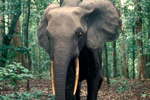
(04/25/2011) It seems difficult to imagine elephants delicately tending a garden, but these pachyderms may well be the world’s weightiest horticulturalist. Elephants both in Asia and Africa eat abundant amounts of fruit when available; seeds pass through their guts, and after expelled—sometimes tens of miles down the trail—sprouts a new plant if conditions are right. This process is known by ecologists as ‘seed dispersal’, and scientists have long studied the ‘gardening’ capacities of monkeys, birds, bats, and rodents. Recently, however, researchers have begun to document the seed dispersal capacity of the world’s largest land animal, the elephant, proving that this species may be among the world’s most important tropical gardeners.
Congo legalizes 15 logging concessions, prompting concern that moratorium will be lifted next
(03/13/2011) The Democratic Republic of Congo (DRC) has legalized 15 logging concessions that were previously listed as illegal under an effort to clean up the industry of widespread corruption. The environmental group, Greenpeace, fears that the move precedes an announcement to lift the DRC’s moratorium on granting any new logging concessions, which would open the Congo Basin to widespread logging.
After another ranger killed, Virunga National Park requests UN peacekeepers
(02/01/2011) Less than a week after 3 wildlife rangers and 5 soldiers were killed in Virunga National Park by the rebel group Democratic Forces for the Liberation of Rwanda (FDLR), another ranger has been killed and a driver put in the hospital in critical condition. The situation has pushed park authorities to request UN peacekeepers for the park.
Eight rangers, soldiers killed in Virunga National Park
(01/25/2011) Yesterday morning, 3 wildlife rangers and 5 soldiers working in Virunga National Park were killed by the rebel group Democratic Forces for the Liberation of Rwanda (FDLR). These 8 were killed and 3 more wounded when their vehicle was fired on by FDLR rebels with rocket launchers. Park director Emmanuel de Merode told the AFP that it was the most serious incident to occur in Virunga National Park in the past 12 months.
Financial crisis pummels wildlife and people in the Congo rainforest
(09/27/2010) Spreading over three central African nations—Cameroon, Central African Republic, and Republic of Congo—the Sangha tri-national landscape is home to a variety of actors: over 150,000 Bantu people and nearly 20,000 pygmies; endangered species including forest elephants and gorillas; and, not least, the Congo rainforest ecosystem itself, which here remains largely intact. Given its interplay of species-richness, primary rainforest, and people—many of whom are among the poorest in the world—the landscape became internationally important in 2002 when under the Congo Basin Forest Partnership (CBFP) conservation groups and development agencies agreed to work together to preserve the ecosystems while providing development in the region.



